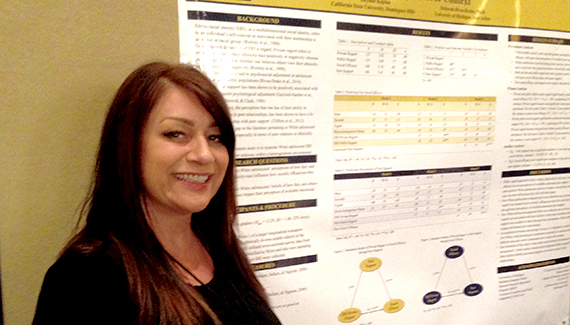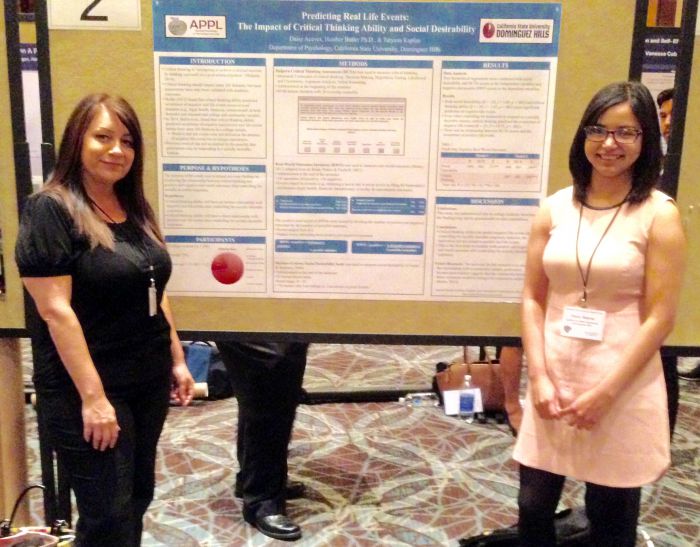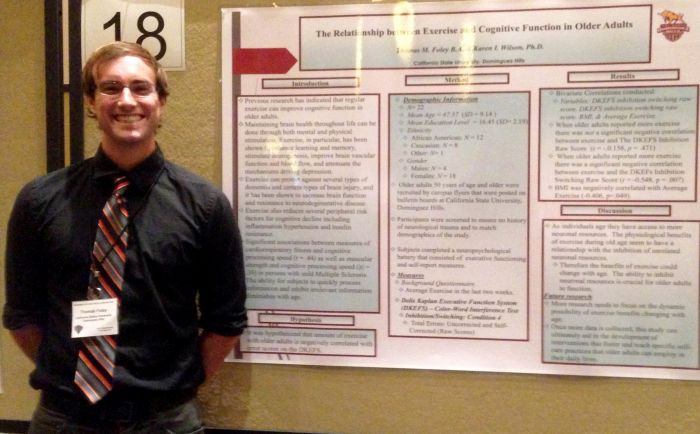Sharpening their presentation skills while taking advantage of networking opportunities with peers and professors at prospective graduate schools, 23 California State University, Dominguez Hills (CSUDH) psychology students had the opportunity to present their in-depth research at the Western Psychological Association Conference’s 95th Annual Convention.
The event was hosted April 30-May 3 by the University of Nevada, Las Vegas. The research presented by the students was derived from the examination of psychological issues and scenarios related to young people, the technology they use, and their health and relationships.

Several CSUDH psychology students presented posters at the convention under the direction of psychology professor Heather Butler, including Tanya Kaplan, a senior cabinet member of the International Honor Society in Psychology (Psi Chi) and a McNair Fellow.
Kaplan won the Psi Chi regional award–and its $300 prize–at the convention for her poster entitled “White Adolescent Ethnic-Racial Regard and Peer Relations.”
“I was completely shocked when I won the award, at first, but once the shock wore off, I felt very proud to have the research recognized by an honor society focused on excellence,” said Kaplan. “I was also delighted to represent CSUDH, which merits recognition for the exceptional support and guidance provided by faculty in our Psychology Department.”
According to Kaplan’s research findings, the more positive Caucasian adolescents believe others view their ethnicity-race, the more socially effective they feel with their peers. And, the more positive Caucasian adolescents evaluate their own ethnicity-race, their perceptions of available emotional peer support is greater.
“Considering continued global diversification, the findings provide a foundation for understanding how white adolescents’ regard the influence on peer relationships when there is no ethnic-racial majority,” she said. “Future research should focus on tracking the development of these social identity components over time.”

Additional poster presentations from Butler’s students included:
- Kaplan, along with MBRS RISE scholar and Psi Chi member Daisy Aceves, presented a poster in the Psi Chi session called: “Predicting Real Life Events: The Impact of Critical Thinking Ability and Social Desirability;”
- Graduate psychology student Thomas Foley: “The Relationship Between Exercise and Cognitive Function in Older Adults;”
- Psychology student Oswaldo Carvajal: “The Effects of Facebook ‘Likes’ and Instagram ‘likes’ on Self-Esteem.”
Convention participation is critical for students who want to get into graduate school, according to Butler. It also provides them an open forum to discover that their psychological research has its place in the psychological community.
“I am so proud of the work my students did preparing their posters and presenting them at the Western Psychological Association Conference. They were involved with every stage of project, from developing materials to conducting the analyses and communicating the results to an audience,” said Butler. “One of my students received an internship at USC after a conversation at the WPA convention last year, which grew into a paid research position. Another student was accepted into her first choice of doctoral programs after several conversations with a professor during a convention.”
Psychology students Marina Armendariz, Victoria vanTwist and Yessenia Magana, along with psychology professors Silvia Santos and Maria Hurtado-Ortiz, presented two posters at the convention: “Obesity-Related Dietary Patterns and Health Status of Diabetes At-risk Latino Students,” and “Assessing Prevalence of Obesity-Related Risk Factors for Diabetes in Latino Students.”
Under the direction of communications associate professor Nancy Cheever, six psychology students who work in the George Marsh Applied Cognition Laboratory presented research with their psychology professors Larry Rosen and Mark Carrier regarding digital technology and communications:
- Kristin Peviani and Rosen: “The Facebook Blues: Social Connection or Source of Depression;”
- Abraham Ruiz, Alex Lim, Lizzette Ceja and Carrier: “Digital Metacognition: Assessing the Impact of University Students Mobile Phone Use;”
- Aimee Miller, Kaitlin O’Brien, Carrier and Rosen: “Effects of Executive Function and Technology Use on Internet Addiction’”
- Claudia Aguilar and Rosen: “Narcissistic Personality and Delinquent Behavior Posts on Social Media;”
- Jeffrey Rokkum, Jane Jacob, Carrier and Rosen: “Multitasking Across Generations.”

Psychology assistant professor Giacomo Bono’s students presented their research findings related to gratitude:
- Robert DeWitz and Oswaldo Carvajal: “Does Gratitude Promote Personal Development?;”
- Christopher Odudu, Azucena Ortiz, and Robert DeWitz: “What Can Parents do to Raise Grateful Kids?;”
- Azucena Ortiz, Christopher Odudu, and Victoria Vantwist: “Gratitude Measures for Youth;”
- Victoria vanTwist, Azucena Vera-Ortiz, and Ozwaldo Carvajal: “The Benevolence of Youth: A Qualitative Study of Childhood Generosity and Gratitude.”
“Gratitude in young people is important to research because we are starting to discover that this virtue, which has long been recognized by religions and cultures across the globe as beneficial, is literally underappreciated by society,” said Giacomo. “So far research my colleagues and I are conducting show that developing gratitude is critical to character in many ways.”